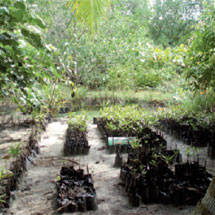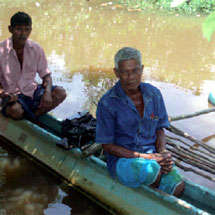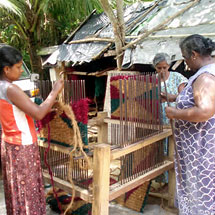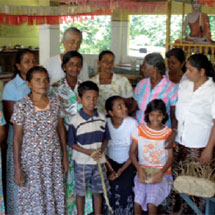Lal Emmanuel and the Nagenahiru Foundation in Sri Lanka
One World Award 2008

He is a member of the organic farming network in Sri Lanka and well integrated in the organic movement. Internationally he is very active in the global “Living Lake Network”.
Mr. Emmanuel gave up a secure life as a civil servant to follow his passion for nature. He is driven by his mission to work foremost for the benefit of disadvantaged people and the young generation. His knowledge on many issues and topics is outstanding and he works with a holistic approach combining the care for nature with the needs of the people. His extraordinary dedication qualifies him very well as laureate of the OWA prize and with his impressive energy he will – now also due to his increased international fame as OWA laureate – inspire people all around the world.
A reflection on the work of Mr. Emmanuel and the Nagenahiru Foundation

The project activities are very diversified and different, but all contribute in an outstanding way to the objective of the One World Award, namely to sustainability.
A look at the activities of Mr. Emmanuel and the foundation has to start with the mangroves, which are threatened by mankind all around the world.

Important in the context of this work is also the involvement in raising environmental awareness of mangroves, which the foundation is accomplishing on the one side through publications and on a practical level through the setting up of two demonstration and teaching centres on mangroves and connected environmental and social issues. To make sure that the lakes can continue to “live” the foundation has also focused on safeguarding clean water. Simple but efficient systems of cleaning waste water (so-called green filters) were installed and there is an ongoing campaign to reduce the pollution of the lake caused by gasoline from boats.


Emmanuel and the foundation do not only contribute to the ecological pillar of sustainability but also to the social and economic objectives. Alleviating poverty and providing economically viable livelihoods is at the heart of the foundation’s work. Apart from the organic programme the foundation has started 2 income generating projects. Together with the women’s organization RANTARU (“Golden Star”) the foundation is providing training and marketing support for handicraft made of reeds, which are cultivated in the wetlands by local families. Another project produces coconut fibre cords which, dyed and woven into doormats, find a good market in Sri Lanka. Many families are already engaged in these economic activities and some families could even start to employ further workers.




